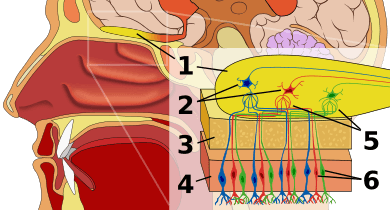Olfaction facts for kids

Olfaction is just a fancy word for the sense of smell. It's how humans and animals notice different smells using their noses. Many animals have a much stronger sense of smell than people do. They can detect tiny particles in the air or even in water that we can't.
Our noses have special cells that can detect different chemicals. These are nerve cells connected to a part of your nose called the olfactory epithelium. All animals with backbones, like us, have these cells. When you smell something, this information first goes to your olfactory system. Then, it travels to the olfactory bulb at the front of your brain.
In insects, like ants or bees, smells are picked up by tiny sensors on their antennae. This information is then sent to a part of their brain called the antennal lobe.
Contents
How We Smell Things
When you breathe in, tiny bits of chemicals from things around you float into your nose. These tiny bits are called odor molecules. They dissolve in the wet lining inside your nose.
Inside your nose, there are millions of special nerve cells called olfactory receptor neurons. Each of these cells has tiny hairs that can grab onto specific odor molecules. Think of it like a lock and key system.
When an odor molecule fits into a receptor cell, it sends an electrical signal. This signal travels up the nerve cell to your brain. Your brain then figures out what that smell is.
The Brain's Role in Smell
The signals from your nose go to the olfactory bulb in your brain. This part of the brain is like a processing center for smells. From there, the information goes to other parts of your brain.
One important area is the limbic system. This system is linked to emotions and memories. That's why a certain smell can sometimes bring back strong memories or feelings. For example, the smell of cookies might remind you of your grandma's house.
Why Smell is Important
Smell is very important for many reasons. It helps us enjoy food. A lot of what we taste is actually what we smell. Try holding your nose while eating something, and you'll notice the difference!
Smell also helps keep us safe. It can warn us about dangers like smoke from a fire or rotten food. Animals use smell to find food, avoid predators, and even communicate with each other.
For some animals, smell is their main way of understanding the world. Dogs, for example, have an amazing sense of smell that helps them track things and find people.
Images for kids
See also
 In Spanish: Olfato para niños
In Spanish: Olfato para niños
 | Delilah Pierce |
 | Gordon Parks |
 | Augusta Savage |
 | Charles Ethan Porter |


